On November 24, 2013, an historic agreement was reached between the P5+1 nations and Iran on the latter’s peaceful nuclear program. Almost immediately, differences of opinion arose over the phrase “mutually defined enrichment program” between U.S. Secretary of State John Kerry and Russian Foreign Minister Sergei Lavrov. Now, the U.S. Treasury Department has added companies and individuals to its sanctions list based on allegations of evading U.S. sanctions on Iran or accusations of being front companies, agents or officials of nuclear-related organizations. As a result, the U.S. Treasury move has brought to a halt negotiations with Iran.
On December 12, 2013, the U.S. Treasury Department announced that it was tightening its regimen of economic sanctions on Iran by targeting additional firms and individuals allegedly involved with Iran’s peaceful nuclear energy program. This act by the Treasury, whose parent agency is the White House, is in direct conflict with the spirit, if not the letter, of the Geneva Joint Plan document, which clearly states, “The U.S. Administration, acting consistent with the respective roles of the President and the Congress, will refrain from imposing new nuclear-related sanctions.” Since the Treasury Department reports to the U.S. President, Obama could have put the brakes on this deal-derailing act, but has not. One cannot help but ask why not?
Under Secretary for Terrorism and Financial Intelligence David S. Cohen, clarifying this apparent deliberate violation, explained, “The Joint Plan of Action reached in Geneva does not, and will not, interfere with our continued efforts to expose and disrupt those supporting Iran’s nuclear program or seeking to evade our sanctions.” Continuing, Cohen warned, “Today’s actions should be a stark reminder to businesses, banks, and brokers everywhere that we will continue relentlessly to enforce our sanctions, even as we explore the possibility of a long-term, comprehensive resolution of our concerns with Iran’s nuclear program.”
In contrast with Cohen’s actions, U.S. State Department Spokesperson Jen Psaki said, “We do feel that putting new sanctions in place during the course of negotiations, even those that are delayed, would be counterproductive, and could unravel the unity of the P5+1.” Russian Foreign Ministry spokeswoman, Maria Zakharova, concurred with her U.S. counterpart, saying, “Widening American 'blacklists' could seriously complicate the fulfillment of the Geneva agreement, which proposes easing the sanctions regime.” Iranian Foreign Minister Mohammad Javad Zarif made it clear to all that if there were to be any new sanctions, “The entire deal is dead,” adding, “If Congress adopts sanctions, it shows lack of seriousness and lack of a desire to achieve a resolution on the part of the United States.” Regrettably, this is exactly what has happened according to Iran’s Chief Negotiator, Abbas Araqchi, who said, “The negotiations were halted by the Iranian Delegation because of new American sanctions.”
The late North American Native Peoples Leader Russell Means pointed out unambiguously that the U.S. is a nation founded upon lies and whose leaders are liars. “America and Israel are based on lies,” he said in 2009, adding, “Now, the U.S. and Israel are focused on Iran because of its oil reserves.” True, the U.S. covets Iran’s energy reserves and its policy toward Iran has been based on the lie of seeking a diplomatic solution for the nuclear issue, but this is only a cover for Washington’s real fear: successful decoupling of energy markets from the U.S. dollar’s domination. So by enticing Iran into agreeing to delay its nuclear program with offers of limited sanctions relief, U.S. leaders were actually executing one step in their plan for regime change to protect the U.S. dollar. However, Iran’s negotiators saw through this charade and halted the talks. According to Iran’s Chief Negotiator Araqchi, the U.S. was “against the spirit of the Geneva deal,” and the expanded sanctions prove this to be the case. Meanwhile, U.S. Secretary of State Kerry still expects the talks to proceed as does EU Foreign Minister Catherine Ashton.
Obama even made the absurd claim that U.S. sanctions brought Iran’s President Dr. Hassan Rouhani to power. Speaking at the Zionist-funded Saban Forum of the Brookings Institute, Obama first lauded the effect of the U.S. sanctions on Iran. “We put in place an unprecedented regime of sanctions that has crippled Iran’s economy,” he explained, which caused Iranians to elect Dr. Rouhani, “And that’s what brought President Rouhani to power.” However, Obama warned, “Now, that doesn’t mean that we should trust him [President Rouhani] or anybody else inside of Iran.” Obama went on to boast to forum organizer Zionist media mogul Haim Saban how all the concessions in the Geneva agreement were obtained from Iran without dismantling any of the existing sanctions regime. “Now, what we’ve done in exchange is kept all these sanctions in place -- the architecture remains with respect to oil, with respect to finance, with respect to banking,” he gloated, with the only exception being a meager $7 billion thaw in $120 billion of Iran’s frozen oil revenue.
There is an old Persian proverb that says, “mahi az sar gand mi zanad,” or in English, “A fish smells from the head.” If the head of state lies, one cannot expect the diplomatic subordinates to be truthful and the American head of state has certainly proved himself to be a pathological prevaricator. He has lied to the American people about closing Guantanamo prison camp, keeping their existing health care plans, the BP oil spill catastrophe and the scope of NSA espionage activities, just to name a few. Now, the U.S. President who in his statement on the occasion of the signing of the accord with Iran said, “We will refrain from imposing new sanctions,” and “now is not the time to move forward on new sanctions – because doing so would derail this promising first step,” appears to have lied again, based on the actions of his subordinate, undersecretary David Cohen.
Interestingly enough, Obama even has lied to Zionist Haim Saban, when the latter asked to what level Iran’s uranium enrichment program would be rolled back. “Down to zero,” responded Obama, while the Geneva Joint Plan states that Iran agreed not enrich uranium over 5 percent and will retain half of its 20 percent enriched uranium for manufacture of fuel for the Tehran Research Reactor. Later on in the same program, Obama repeated the lie, saying “I want to be very clear there’s nothing in this agreement or document that grants Iran a right to enrich.” The U.S. president was truthful, however, when he said, “Military action is one tool that we have in a tool kit that includes diplomacy in achieving our goals, which is ultimately our [the U.S., the Zionist regime and allies’] security.”
Considering the skepticism expressed by the Zionist entity and Saudi Arabia, and the opposition building in the U.S. Congress, we are forced to speculate that perhaps Obama’s intention may actually have been to derail the agreement with Iran. Three senior former U.S. diplomats, Daniel Kurtzer, Seyed Hossein Mousavian and Thomas Pickering, write that “should U.S. Congress or another country actually impose greater sanctions during this six-month period, it will be a clear sign that the West is not interested in a negotiated deal and that the United States has not distanced itself from a policy of regime change.” And, judging by the U.S. Treasury’s sanctions expansion, Washington is still enamored with the Zionist-inspired policy of regime change.
By expanding the list of individuals and firms targeted under the sanctions regimen and calling it “enforcement,” Washington will probably claim that it has lived up to its pledge not to impose new sanctions. However, this is just a semantic ruse, since practically speaking, the Treasury Department by its actions has imposed “new” sanctions on 12 Iranian firms and 6 individuals. And let us be clear that these new sanctions are in the furtherance of the Zionist entity’s security concerns, which are the foremost concern of any U.S. president, as Obama himself admitted. “And the one thing I will say to the people of Israel is that you can be assured whoever is in the office I currently occupy, Democrat or Republican, that your security will be uppermost on our minds,” he emphasized. One would think that the security of the American people should be uppermost in the U.S. president’s mind; it involves a little matter of trust.
If the U.S. was serious about building trust and reaching a final agreement with Iran over its peaceful nuclear energy program, it would have frozen new sanctions activity for the six-month period of the Geneva Joint Plan as agreed. Because of its failure to do so, I view the U.S. Treasury’s actions as a deliberate provocation by Washington, and its accomplices Riyadh and Tel Aviv, to justify military action to achieve their policy goals of regime change in Tehran.
MNA
END
END


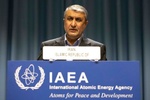
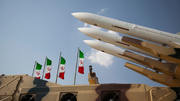
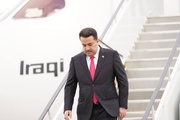



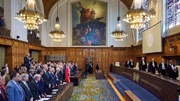
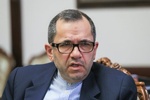







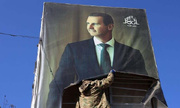

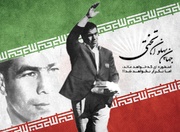

Your Comment